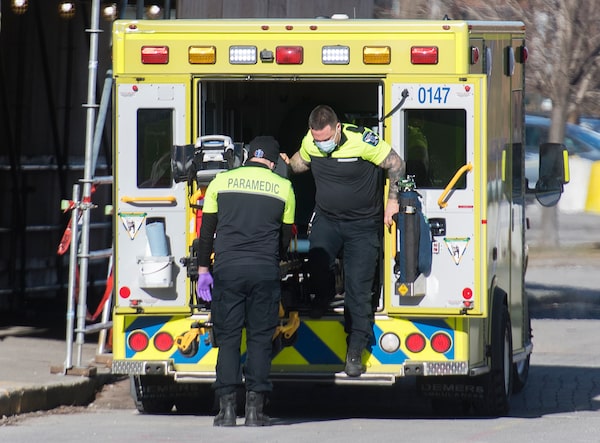
Paramedics transfer a person from an ambulance into Verdun hospital in Montreal on Dec. 29, 2020.Graham Hughes/The Canadian Press
Growing concerns over the impact of new variants of the virus that causes COVID-19 have the federal government rushing to bolster Canada’s surveillance efforts and set up a network of researchers who can quickly assess the new threats as they emerge.
“We’re putting our best experts on it,” Prime Minister Justin Trudeau said on Friday. The announcement comes with $53-million in funding for what the government called an integrated strategy to connect people who identify the genetic signatures of virus samples in search of variants with scientists and facilities that can determine whether the virus is mutating into more harmful forms.
On the same day, Chief Public Health Officer Theresa Tam said three known variants of concern have been identified in eight provinces, with total confirmed cases exceeding 450. The list includes one case in Toronto of the P.1 variant, first identified in Brazil, connected to a person who travelled from that country. One case study has shown the variant infected a 29-year-old woman who had COVID-19 nine months earlier.
At least 28 cases of the B.1.351 variant, first associated with South Africa, have turned up, Dr. Tam said. Earlier this week, a South African study found that variant to be particularly effective at evading the immune response created by the AstraZeneca vaccine.
COVID-19 variants reveal evolution’s power to rearm pandemic
For Canada, the immediate concern is the hundreds of cases of the B.1.1.7 variant that first arose in the U.K. and for which there is ample evidence of heightened transmission of the disease.
“My biggest worry right now is those cases developing additional mutations,” said Fiona Brinkman, a professor of bioinformatics at Simon Fraser University who studies how pathogens respond when they are challenged by vaccines and drugs.
In the U.K., for example, the variant has already picked up a further change to its amino acid sequence known as E484K, which is also present in the South African and Brazilian lineages of the virus. The change translates into a slightly different shape to the part of the coronavirus spike protein where it makes contact with human cells to initiate an infection – and where it is hoped that antibodies produced after vaccination can intercept the virus.
The more the variant spreads in Canada, the more likely it is that a similar change could arise here, Dr. Brinkman said, adding, “That could really give it a further edge, particularly regarding efficacy against vaccines.”
The new research network aimed at addressing the variants in Canada will include scientists who can investigate whether an emerging variant is likely to increase the rate at which the disease spreads or change its severity across population groups.
“If a local variant shows up within Canada, we need to have everything ready to be able to look at that and see what it means. ... That’s where a big part of the research comes in,” said Charu Kaushic, a professor at McMaster University’s Immunology Research Centre, who is involved in assembling the network on behalf of the Canadian Institutes of Health Research, a federal funding agency.
Earlier this week, the government invited researchers who study the variants to apply for funding to be part of the network. Applications are due by Feb. 23, an indication of how rapidly the government wants the system to be activated.
Yet, in Ontario, which accounts for more than half of all the variant cases in the country, that urgency is juxtaposed with a provincial move to relax stay-at-home measures as case numbers drop overall. Infectious-disease experts say they fear a third wave could follow soon after if the variants are not contained.
“Our optimism has failed us again and again during the pandemic,” said Irfan Dhalla, a physician and vice-president with the Unity Health network of hospitals in Toronto.
Dr. Dhalla added: “The prudent thing to do right now is to err on the side of caution, and reopen very, very slowly, making sure we have both pandemics under control – the old variant pandemic and the new variant pandemic.”
The large number of COVID-19 infections in some places makes it more likely for new variants of the virus to emerge. Science Reporter Ivan Semeniuk explains how vaccines may not be as effective against these new strains, making it a race to control and track the spread of variants before they become a dangerous new outbreak.
The Globe and Mail
Sign up for the Coronavirus Update newsletter to read the day’s essential coronavirus news, features and explainers written by Globe reporters and editors.
 Ivan Semeniuk
Ivan Semeniuk